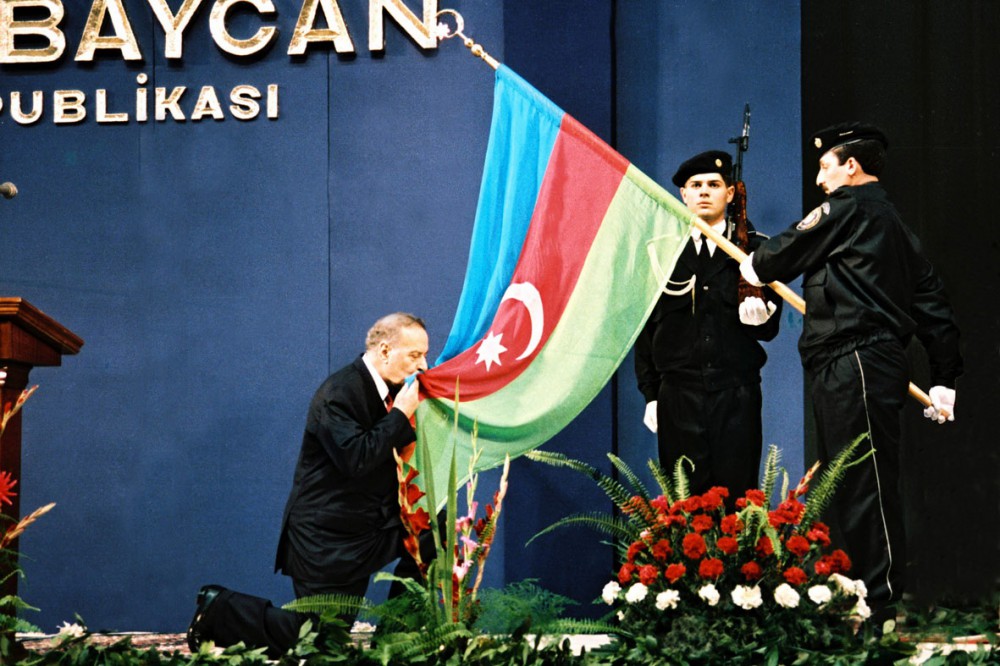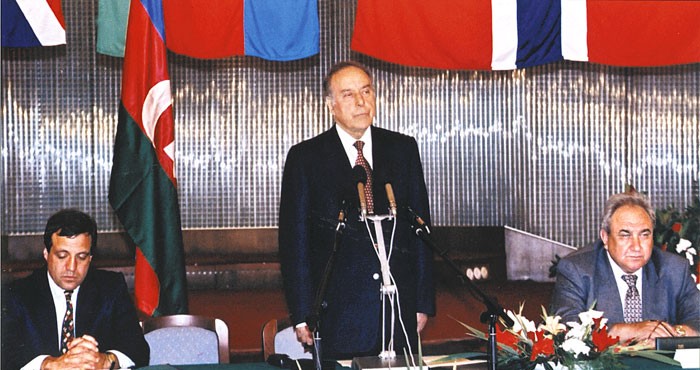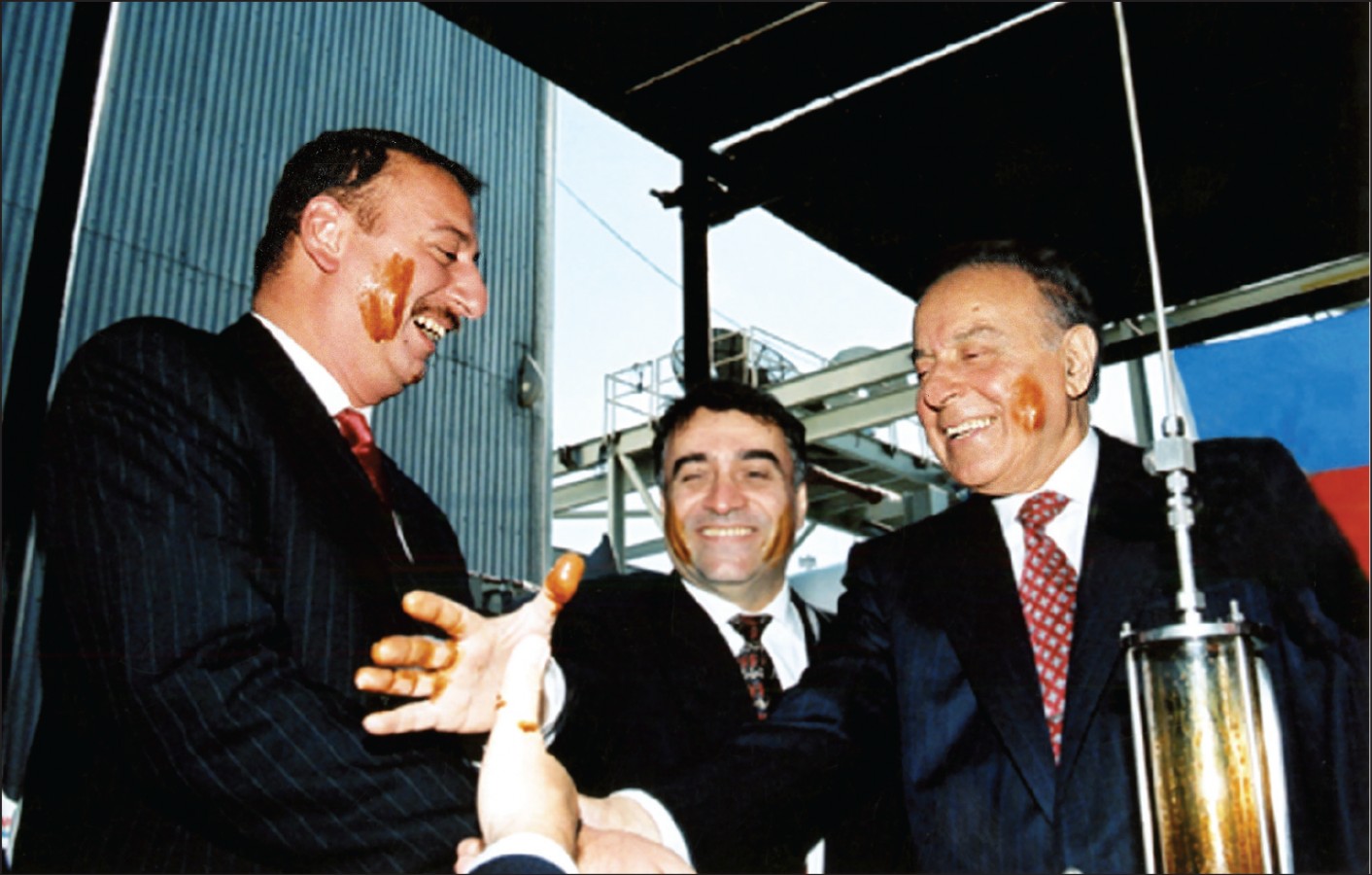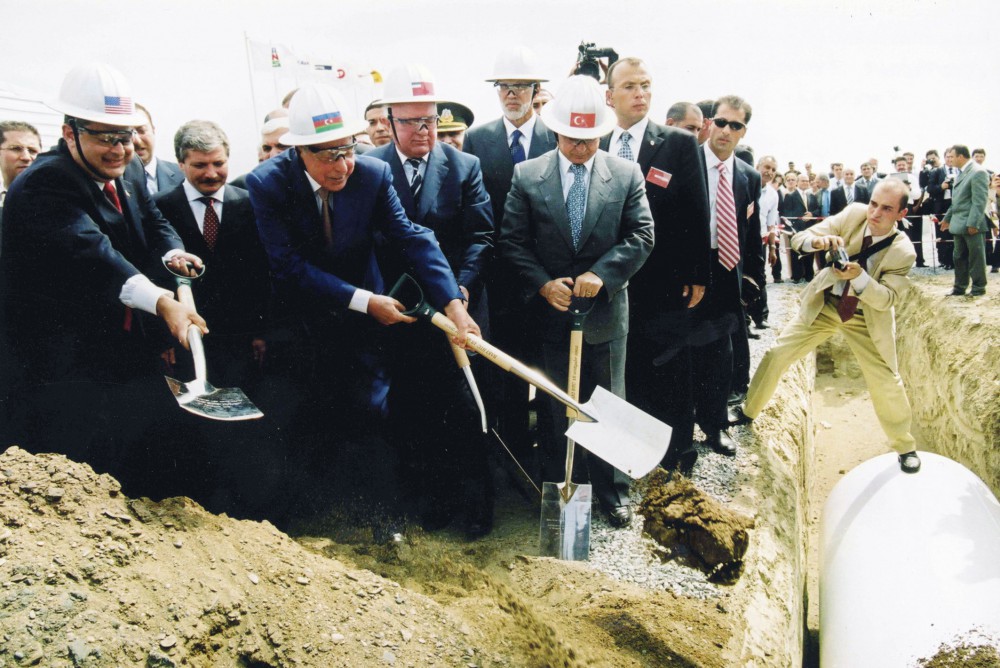THE CONTRACT OF THE CENTURY
The foundation we laid with the contract of the century creates favorable
conditions for the strengthening of the state sovereignty of independent
Azerbaijan, the development and happy life of the people of the country
in the 21st century. I believe that the 21st century will be the happiest
period for the independent state of Azerbaijan.
Heydar Aliyev

Heydar Aliyev's return to the government by the request of the people in 1993 laid the foundation for the important changes in the political and economic life of Azerbaijan. Heydar Aliyev who managed to avert the great disasters in Azerbaijan initiated the conduction of measures for the economic growth of the country as well. Vice President of SOCAR Ilham Aliyev has been involved in the process of negotiations since the very beginning and he became the most active participant in the said process. He adhered to the following brief and strong idea in his activity: "Our objective is not only to produce oil but also to transport it and get incomes. We must use the oil, political, economic, and other incomes to ensure the interests and welfare of the people. The numerous meetings and negotiations in which he participated were conducted under the said slogan. Certainly, a number of difficulties and obstacles also existed. The last stages of the negotiations related to the contract of the century in Istanbul and Huston in spring and summer of 1994 were the hardest ones. Sometimes the crisis occurred and the negotiations reached suspension due to the non-acceptance of definite provisions. Ilham Aliyev recalls the following: "We said the foreign companies: You protect interests of different companies and we protect the interests of the Azerbaijani people. If you do a mistake it will affect only a project of your company but in case we do a mistake that will cause harm to the people of Azerbaijan. In other words, we must not do mistakes". Despite all the difficulties the contract was worked out in conformity with the national interests of Azerbaijan.
A production sharing agreement on the joint development of deepwater reserves of Azeri, Chirag, and Guneshli was signed at the Gulistan Palace in Baku on September 20, 1994. The contract was called the contract of the century due to its historical, political, and international importance and was reflected in 400 pages and 4 languages. It included 13 leading oil companies (AMOCO, BP, McDermott, UNOCAL, SOCAR, LUKOIL, Statoil, Exxon, Turkish Petrol, Pensoil, Itochu, Remco, Delta) from 8 countries of the world (Azerbaijan, USA, Great Britain, Russia, Turkey, Norway, Japan, and Saudi Arabia). Thus the new oil strategy and its doctrine were initiated successfully.

The International Operating company was established in the first days of the contract of the century and started its conjoint activity with SOCAR in accordance with its ratified program. Later the contract promoted the signing of 32 contacts with 41 oil companies from 19 countries of the world. The contract of the century was included in the list of the largest documents concluded in the world for the volume of hydrocarbon reserves and investments. USD 57.6 out of 64 billion stipulated for the development of the oil industry in Azerbaijan went for the assimilation of the offshore fields and conduction of exploration on the prospective structures.
Significant changes occurred in the economics of Azerbaijan since the commencement of the contract of the century and great works were carried out. First of all, in frames of the project of oil production Chirag-1 was restored in accordance with the modern standards in 1995 and the upper module of the said plant was modernized and equipped with new technologies for the drilling of richer wells. The new drilling plant enabled to drill of horizontal plants. The wells A-18 (with the depth of 5500 meters), A-19 (with the depth of over 6300 meters) drilled with the maximal propensity started operating with the high production of oil. in 1997, the Chirag field started oil production.

The first tanker load of Azeri profit oil sailed to the world in December of 1999. The currency received from the sales of oil went to the State Oil Fund of the Republic of Azerbaijan established by the national leader of the Azerbaijani people Heydar Aliyev and serves the people of the country. The Azeri section of an oil pipeline extending to 231 to the north and 720 mm in diameter was restored and constructed and the first Azeri oil was transported to the port of Novorossiysk (Russia) on October 25, 1997. The annual capacity of the pipeline is 6.1 million tons.
The Baku-Supsa export pipeline extending to 837 kilometers to the west and 530 mm in diameter was constructed and commissioned on April 17, 1999. The annual capacity of the pipeline is 5.1 million tons.
The country produced 9 million tons in 1997 and reached a peak in 2009 and produced more than 50 million tons.
The sailing drilling plant Dede Gorgud (former Caspmorneft) was restored and modernized for drilling the deep water test wells in the Caspian Sea. The plant is capable of drilling 7620 meters in the depth of 50-475 meters. Another plant Istiklal (former Shelf-5) was repaired and modernized and enabled to drill the wells of 7620 meters in the depth of 50-700 meters. 6 test wells were drilled as the result of the works carried out in Azeri-Chirag-Guneshli fields by means of the modernized drilling plants and thus oil reserves increased by 30%. These plants operated successfully on the Shahdeniz and Azeri-Chirag-Guneshli fields within the Caspian Drilling Company established in 1996. Great achievements were reached in the sphere of technique and technology with the help of the plant "Leader" named after Heydar Aliyev and constructed for Azerbaijan by foreign companies.
Presidents of the USA, Turkey, Azerbaijan, Georgia, Kazakhstan, and Turkmenistan signed an intergovernmental contract on the establishment of the main export pipeline Baku-Tbilisi-Ceyhan at the OSCE summit held in Istanbul, Turkey November of 1999.

The foundation stone of the Baku-Tbilisi-Ceyhan pipeline was laid with the participation of the national leader of Azerbaijan Heydar Aliyev, Turkey, and Georgia at the Sangachal terminal in Baku on September 18, 2002, and its construction was initiated. On July 13, 2006, the opening of the Heydar Aliyev Baku-Tbilisi-Ceyhan main export pipeline which is the largest energy project of the 21st century, was held in Ceyhan, Turkey.
Construction of the Baku-Tbilisi-Erzurum gas pipeline and the start of the gas production from the Shah Deniz field was a historical event such as the Baku-Tbilisi-Ceyhan oil pipeline. Today, Azerbaijan is a country that not only exports oil but also, exports gas as a logical consequence of this project.
Our country started to play a crucial role in the world`s energy market with the launch of the Baku-Tbilisi-Ceyhan oil pipeline and Baku-Tbilisi-Erzurum gas pipeline in 2006 and 2007 respectively.
In 2010, a resolution was signed to operate the Chirag Oil Project. $ 6 billion development plan for the Chirag oil project and large investment project has entered the country's oil history. This project which is known as West Chirag will help stabilize oil production in the Azeri-Chirag-Guneshli block and maximize oil production. The capacity of the platform is 25,000 tons of oil and 6.5 million cubic meters of gas per day.
On the 20th anniversary of the Contract of the Century, the foundation of the Southern Gas Corridor project was laid at the Sangachal terminal in September 2014.
In order to transport Azerbaijani gas and ensure the operation of the Southern Gas Corridor, large-scale works completed over Shah Deniz gas condensate field, South Caucasus Pipeline (SCP), Trans-Anatolian Pipeline (TANAP), and Trans-Adriatic Pipeline (TAP).
The "Contract of the Century" signed in difficult political and economic conditions and led to the foundation of Azerbaijan`s economic development.

On the 23rd anniversary of the Contract of the Century, the agreement signed on amendments on the production sharing and development of the Azeri-Chirag-Guneshli block in Baku in September 2017. According to this regulated agreement, the duration of the `Contract of the Century` extended until 2050.
When the Contract of the Century was signed in 1994, it is estimated that there are 511 million tons of oil in Azeri-Chirag-Guneshli. However, reserves exceeded forecasts. At present, Azeri-Chirag-Guneshli has 500 million tons of unproduced oil.
According to the new agreement, BP will remain the operator of the project. As part of the agreement, SOCAR's share in the Azeri-Chirag-Gunesli field will be increased from 11.65% to 25%, and international partners will pay a $ 3.6 billion dollar bonus to SOCAR.
Following the approval of the agreement, the new share in Azeri-Chirag-Gunesli partners are as follows: BP — 30.37%; AzACG (SOCAR) — 25%, Chevron — 9.57%, Inpex — 9.31%, Statoil — 7.27%, ExxonMobil — 6.79%, TP — 5.73%, Itochu — 3.65%, ONGC Videsh Limited (OVL) — 2.31%.
The new terms of the agreement not only reflect the growing financial and technological potential of our country and company since 1994 but also demonstrate the confidence of foreign partners in the Azerbaijani economy and raise our partnership to a new level.
A gorgeous ceremony was held in November 2017 in Azerbaijan over the production of two billion tons of oil. Out of two billion tons of oil, 700 million tons were produced during independence.




